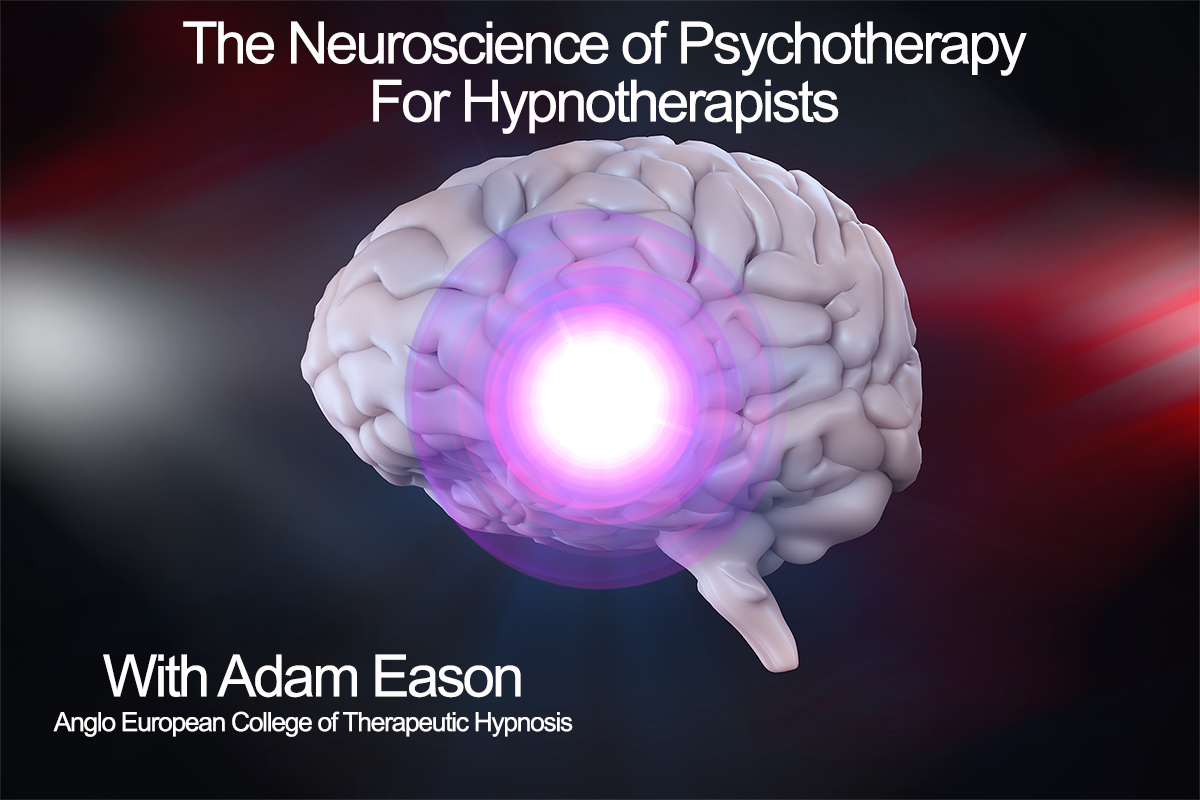I recently ran an online series of interactive lectures entitled: The Neuroscience of Psychotherapy for Hypnotherapists.
I am about to make this into a full online training programme and am offering the chance to purchase it now before the small finishing touches are made and the price increases to it’s full regular fee. You’ll still have the access to the full videos, the manuals and you’ll have all the updates as they are added in coming weeks. This is just the initial version, at a lower price, while we work on the finishing touches.
This is a 4-part online course that primarily offers up a series of 5 x 2 hour lectures spread into 4 distinct parts sharing findings from neuroscience that can be incorporated into your hypnotherapy work with clients. Each lecture explains the neuroscience of many of your pre-existing approaches to hypnotherapy as well as offering brand new tools and techniques with a range of exercises for you to engage in along with reflection points to use and consolidate learning at the end of each session.
The science suggests that one reason some therapists don’t get the results they seek with their clients is that they may simply be doing the right things but at the wrong time, working against how the brain heals, instead of with it. This point is explained in terms of the neuroscience of the order in which the brain responds and reacts and the parts of the brain that when activated, inhibit other areas of the brain from being effective.
So early on in this training I provide an understanding of how to better apply some therapeutic techniques, and in what order, with the aim of increasing their efficacy according to neuroscience.
Within the programme, having initially discussed and explained the varying areas of the brain and the order in which they function as well as which areas of the brain will inhibit other areas of the brain if activated, we establish the basics of how we can use the insights and discoveries in the field of neurobiology and neuroscience within our therapeutic approach as hypnotherapists, we explore four areas of intelligence; somatic, emotional, relational, and reflective, that all contribute to the development of our clients.
Within the first part of this programme, we establish the basics and seek to understand brain alterations that occur from anxiety, trauma, and depression as well as brain-changing techniques that can help clients recover from each. We discuss the anatomy of the brain and the way it responds to varying stimuli.
The aim is that by by understanding the biological factors at play during the stresses of life, as therapists we are better able to support and guide as well as having a better idea of how to direct our treatment plans.
We’ll learn about neuroplasticity and how to help our hypnotherapy clients enhance their own neuroplasticity to heal. We’ll examine how stress and modern stressors effect the brain and of course I’ll share the research and literature supporting all of these things.
Additionally, we’ll explore the conditions present in the therapeutic relationship that are important for us to engage in to stimulate change in our clients.
In the second part of the programme, we begin to explore the power and impact available when we engage with this work. I also share with you the research that supports these findings. We discuss the difference between stress and a stressor, and introduce the four mechanisms of conditioning and brain change.
Within the third part of this programme, I offer two lectures that cover theme’s of varying intelligences and how they pertain to the hypnotherapeutic work that we do. We explore somatic intelligence and how the body can contribute to rewiring of the brain. In particular we explore embodied intelligence and emotional intelligence and I highlight two of the most difficult emotions our clients can experience as they seek to change. We also explore relational intelligence and how relationships effect the brain and explore regulation and resonance within that. We also examine reflective intelligence and how awareness, acceptance, and action all impact the brain and our development. I offer a variety of techniques and applications (along with written versions within the manual provided) that you can use with clients immediately to help achieve your therapeutic aims and to run alongside your pre-existing hypnotherapy skills.
Within all of the first three parts of this programme, you learn practices and techniques you can use with your clients to develop and support each of the areas being detailed theoretically.
The final session of the programme examines trauma and how to promote and develop post-traumatic growth with your clients. When examining aspects of trauma, we also examine some of the ways change gets inhibited or blocked within the healing process and how you can help overcome those with your hypnotherapy clients.
The programme concludes by discussing the latest science about and promoting brain health as an instrumental factor in maintaining therapeutic changes. I’ll be sharing a range of approaches that you’ll be able to use right away to promote a healthy brain in yourself as a hypnotherapist seeking to avoid burnout and compassion fatigue and importantly, be able to apply to those that you work with in your hypnotherapy practice.
These are broad strokes, there are reflection points at the end of each session, practical sessions that I guide you through too, and a couple of manuals filled with techniques detailed within the programme.
For now, and until the programme has been proofread and beta tested, and subsequently updated and tweaked, the entire programme is £77.00. If you invest today at that price, you’ll still have the fully polished version as we make changes and updates to the programme at the end of August. Click on the Buy Now buttons on this page to invest in the full programme today. You’ll have lifetime access to it. If you prefer not to pay using PayPal, email me using the address on this website and I can send you bank details to make a transfer. Once your payment has gone through, we’ll be in touch to organise your access.
I send my very best wishes, and I hope you enjoy this programme – Adam.

